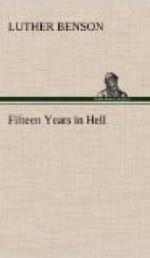The most hopeless and wretched slave on earth is he who has bound himself with the fetters of alcohol, and it is a sad and lamentable truth that among thousands very few ever escape from the soul-destroying, health-ruining bondage of an appetite for intoxicating drink. There is only one here and there of all the hosts that are enchained and cursed who succeeds in breaking the bonds which bind body, soul and spirit. So far as the prospect of success is concerned in winning men from evil, I would say, let me go to the brazen-faced and foul-mouthed blasphemer of the holy Master’s name; let me go to the forger, who for long years has been using satanic cunning to defraud his fellow-men; let me go to the murderer, who lies in the shadow of the gallows, with red hands dripping with the blood of innocence; but send me not to the lost human shape whose spirit is on fire, and whose flesh is steaming and burning with the flames of hell. And why? Because his will is enthralled in the direst bondage conceivable—his manhood is in the dust, and a demon sits in the chariot of his soul, lashing the fiery steeds of passion to maniacal madness. No possible motive or combination of motives can be urged upon him which will stand a moment before the infernal clamorings of his appetite. Wife, children, home, relatives, reputation, honor, and the hope and prospect of heaven itself, all flee before this fell destroyer. The sufferings and agonies untold of one human soul securely bound by the chains forged by rum are enough to make angels weep and devils laugh. I have no desire to discourage those who have this habit fastened on them. I would not say to them: You can not break away from it. I would do all in my power to aid and strengthen every such person in any attempt he might make to be free. There is escape, but courage is required to make it, and greater courage than has ever been exhibited on the field of battle, amid the thunders of cannon, the roar of deadly conflict, the gleam of sabre and glitter of bayonet. But rather than die the drunkard’s death, and go to the drunkard’s eternal doom, every drunkard can afford to make this fight. It were better, ten thousand times, that every such one should do as I have done—voluntarily go to an asylum and be restrained until he so far recovers that he can of his own will resist temptation. And there is another aid—a strength stronger than our own—God! He will help every unfortunate one that goes to him in sincerity and humbly implores the divine aid.
I desire here to make a statement in justice to myself. There are three laws, the human, the natural and the divine. You may violate a human law, and the judge, if he sees fit, may pardon your offense. If you violate the divine law, God has prepared a way of escape, and promises pardon on conditions within the reach of all, but for a violation of that which I call natural law, there is no forgiveness. The penalty for every such violation must be, and




